Episodes
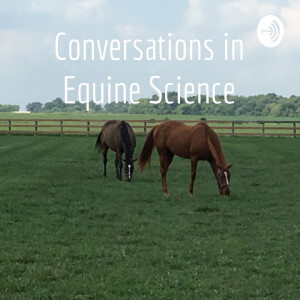
Friday Nov 27, 2020
Friday Nov 27, 2020
Reference Resources:
Schlote, Sarah. (2019) Security in Connection and Co-regulation: Safeguarding the Horse from Traumatic Re-enactments in EQUUSOMA.
Therapy Centers:
rideonstl.org
https://festinalente.ie/
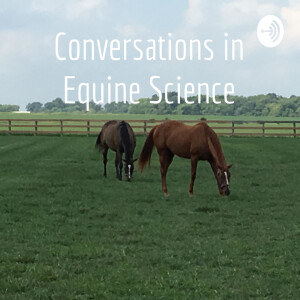
Friday Nov 20, 2020
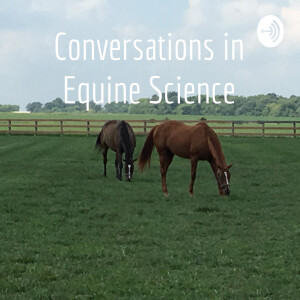
Friday Nov 13, 2020
Friday Nov 13, 2020
Join Kate and Nancy as they interview Tom Brodahl on the advantages of using water treadmills for the rehabilitation and conditioning of our equine companions and athletes.
www.hudsonaquatic.com
To contact Tom about the treadmills and/or spa: info@hudsonaquatic.com
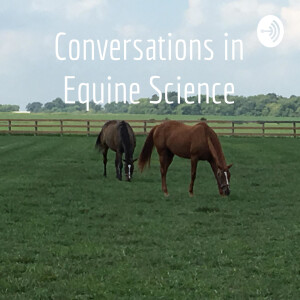
Friday Nov 06, 2020
Friday Nov 06, 2020
Reference List:
Barrey, Eric (2014). 'Biomechanics of locomotion in the athletic horse' Ch. 10 in Hinchcliff, KW, Kaneps AJ, & Geor, RJ. Equine Sports Medicine and Surgery, Saunders, Edinburgh. pp. 189-209.
Lameness Lab #1: https://youtu.be/PQ3iyoiZwA0
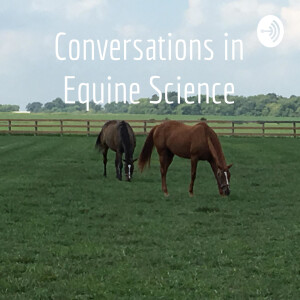
Friday Oct 30, 2020
Friday Oct 30, 2020
Research Reference:
Greco-Otto, Persephone et al., 2017. "Workload of horses on a water treadmill: effect of speed and water height on oxygen consumption and cardiorespiratory parameters". BMC veterinary research, 13(1), p.360.
Industry videos:
ECB:
https://youtu.be/NoFq_BOXcxU
Hudson Aquatics:
https://youtu.be/o-egugRbfJk
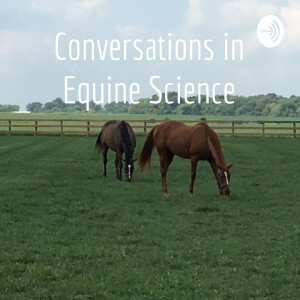
Friday Oct 23, 2020
Friday Oct 23, 2020
Research Reference:
Catalano, Devan N et al., 2019. The Effect of Goldfish (Carassius auratus) on Water Quality in Horse Stock Tanks. Journal of equine veterinary science, 79, pp.73–78.
Key "takeaways" :
Keep tanks clean. Water odor, temperature, turbidity and color will determine intake.
Horses should drink 1 gallon of water per 100lbs or for a 1,000 lbs horse = 10 gallons per day. Preferably 10 to 15 gallons/day. A horse eating fresh grass (pasture) will require less water while a horse eating hay usually requires more water.
A mentally and physically thriving horse is usually given required amounts of forage, water, movement (turnout) and social interaction with conspecifics.
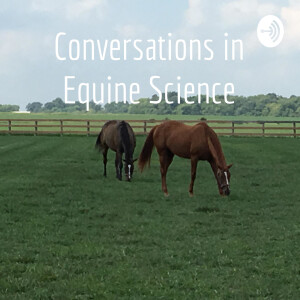
Friday Oct 16, 2020
Friday Oct 16, 2020
Research Reference:
Bulmer, Louise S et al., 2019. High-starch diets alter equine faecal microbiota and increase behavioural reactivity. Scientific reports, 9(1), pp.18621–11.
The equine digestive tract is better suited to a high fiber-fat low starch diet. This type of diet results in healthier microbial populations within the intestines and results in a more settled pattern of behavior. Horses are designed to eat small amounts more frequently mimicking grazing/trickle feeding behavior.
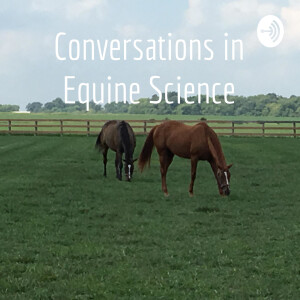
Friday Oct 09, 2020
Friday Oct 09, 2020
Research References:
McBride, Sebastian D & Mills, Daniel S, 2012. Psychological factors affecting equine performance. BMC veterinary research, 8(1), p.180.
For optimal performance of our equine partners we need peak physical fitness and a correct psychological state. Within that psychological state there are 3 components; Temperament, Mood and Emotional Reactions.
Stereotypical Behaviors and Persistence Article:
Hemmings A, McBride SD, Hale CE: Perseverative responding and the aetiology of equine oral stereotypy. Appl Anim Behav Sci 2007, 104(1–2):143–150.
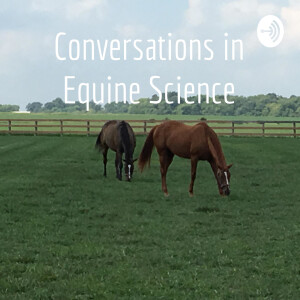
Friday Oct 02, 2020
Friday Oct 02, 2020
Research Reference:
Lamperd, W., Clarke, D., Wolframm, I., Williams, J.(2016). What makes an elite equestrian rider? Comparative Exercise Physiology, 12(3), pp.105–118.
Wolframm, I., Williams, J., Marlin, D. (2015). The role of personality in equestrian sport: an investigation. Comparative Exercise Physiology 11: 133-144.
Books Recommended:
"Outliers" by Malcolm Gladwell and "How Good Riders Get Good" by Denny Emerson
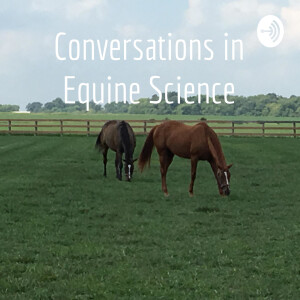
Friday Sep 25, 2020
Friday Sep 25, 2020
A Preliminary Study Investigating the Influence of Auditory Stimulation on the Occurrence of Nocturnal Equine Sleep-Related
Behavior in Stabled Horses. (2019)
Naomi Hartman , Linda Margaret Greening *
Equine Science Department, Hartpury University, Gloucester, Gloucestershire, UK
https://www.youtube.com/watch?v=CxPcnhcWzjY (Beethoven's 9th Symphony used in the above referenced research paper).





